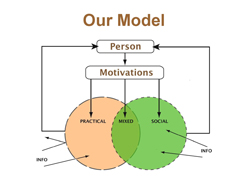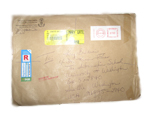artifacts
Why these intellectual experiences?
My intellectual development is in my hands. Like many iSchool students, I am not satisfied with the easy answer, and have taken steps to build my knowledge by pursuing the challenging. In my solo explorations (The Poetry Project and the Elfreda Chatman manuscript work), I pursued the link between my humanities background and information science. More and more, scholars in the humanities are connecting technology-based analysis to their scholarship. By doing some of that intellectual work for myself, I am in a position not only to understand the hurdles to technology adoption in the humanities and the specialized needs of those scholars, but also the amazing possibilities for acting as a bridge between the resources of library and information science and this scholarly work.
In my team experiences (The Information Behavior of Grocery Shoppers, Annotative Wayfinding Behavior), the opportunities were three-fold: to develop a clear understanding of what is happening for the researched subjects in these examinations, to produce intellectually rigorous and relevant research in a short time period, and to do that work successfully as a team. The first two of these are challenging enough in themselves, but perhaps the most difficult is that team success. Unlike managing or leading paid employees (where good or bad performance can lead to specific consequences), members of a class who work as a team can sometimes be more responsive to their needs as individuals than the needs of the group. These class-based team experiences have developed my leadership skills in a positive way that my previous management experiences have not.

LIS 510 - Information Behavior of Grocery Shoppers
 LIS 510 was my first experience writing a social science research paper,
let alone writing one as a group. I feel extremely lucky to have been a
member of what I consider to have been the best group in the class, along with
Jennifer Rohan, Wanna Net, and
Kristen Dietiker. Each one of us had a
commitment to both the group and to the quality of the produced work, and
I am incredibly proud of our result.
LIS 510 was my first experience writing a social science research paper,
let alone writing one as a group. I feel extremely lucky to have been a
member of what I consider to have been the best group in the class, along with
Jennifer Rohan, Wanna Net, and
Kristen Dietiker. Each one of us had a
commitment to both the group and to the quality of the produced work, and
I am incredibly proud of our result.
For this final project, which was a presentation as well as a formal paper,
we worked together to continue our initial investigation of grocery stores
as information grounds. Our comparative study of traditional grocery stores
(like QFC or Safeway) with non-traditional places to buy groceries (like Pike
Place Market) included both qualitative and elementary quantitative methods.
Through interviews and observations, we collected responses and data points
which we then coded to look at trends across time intervals, locations, and
individuals.
Information Behavior of Grocery Shoppers: Final Paper
Information Behavior of Grocery Shoppers: Presentation

DX ARTS 411 - Poetry Project
In this project, I examined a body of my own poetic work through a lens of technology. Traditional poetic analysis is through a critical reading of the texts themselves, sometimes including the precursory or manuscript versions of the poems. Similarly, textual studies scholars have used tools like concordances and word frequency analyses to reveal additional information about historical texts.
I began by looking to these traditional tools and building those
methods into a more technologically-centered exploration. For one poem
that had many longhand manuscript rewrites, I selected one key passage and
scanned the original manuscript pages in order to make an animated web-displayable
image (a .gif) showing the initial, intentional transformations. Using a
command line environment for Windows, I also processed the Word documents
of the poems I considered "completed," or publishable, into one
very large text file of the individual lines of the poems, and then used
a command-line script to build a word count and frequency file, which I then
used with freely available code to transform into a tag cloud. Finally,
I used the text file of the lines of poetry as a source file for freely
available PHP and JavaScript scripts which I used to create randomly generated
poems. These Fluxus-inspired "machine" poems, which bear a
strong resemblance to poems I have created with more traditional intention,
confront the ideas of textual authority and authorial intent.
Poetry Project

Annotative Wayfinding - A Human Subjects Research Project
In Amsterdam, my group began with a successful Human Subjects Research application and went from fieldwork to analysis to presentation in less than 30 days. My colleagues, Ann Swearingen, an MLIS student, and Sunil Garg, a computer science undergraduate, worked with me to interview n = 14 subjects, perform field observations, record data, analyze it, and deliver a conference presentation on our findings.
At first, I thought that to go from a nebulous research question like "How do people find their way around?" to the fully-formed research questions, to a literature review and then writing the research instruments and Human Subjects Research application in less than one term was challenge enough. Because I had no experience with social science research outside of my group project for LIS 510, I had no idea the levels of scholarship, data collection, data analysis, and presentation that were required once those initial hurdles had been cleared, on top of trying to do these things as a group.
This process introduced me to the rigors of research scholarship, helped
me appreciate what leadership means outside of a work environment, and has
resulted in work I feel is representative of the best of my academic ability.
Annotative Wayfinding Behavior: Final Paper
Annotative Wayfinding Behavior: Slides

Elfreda Chatman - Her Final Manuscript
 I have been able to work with Karen Fisher and her
colleagues Crystal Fulton (at University College, Dublin)
and Gary Burnett (at Florida State University)
on Elfreda Chatman's last manuscript. This collection of the writings,
transcripts and notes she was working on before her death will be developed
by this team of scholars into a complete work. For the project, I built a
timeline of the documents, identified which documents to collect into a
preliminary version of the manuscript, then copy edited and corrected all
237 pages.
I have been able to work with Karen Fisher and her
colleagues Crystal Fulton (at University College, Dublin)
and Gary Burnett (at Florida State University)
on Elfreda Chatman's last manuscript. This collection of the writings,
transcripts and notes she was working on before her death will be developed
by this team of scholars into a complete work. For the project, I built a
timeline of the documents, identified which documents to collect into a
preliminary version of the manuscript, then copy edited and corrected all
237 pages.
It is no small opportunity to read the words of one of Information Science's
greatest thinkers, let alone one whose life's work is so inspiring to me.
Elfreda Chatman's attention to the information behaviors and needs of those
who often are overlooked or have no opportunity to speak for themselves is
something I also aspire to. As I am a former janitor, one of Chatman's previous
research groups, the chance to contribute in any small way to what will
be her final work resonates deeply with me. That this work will likely
include her advice and suggestions for information science researchers
based her experiences is even more powerful, and I look forward to trying
to live up to her expectations of what a researcher ought to be.
Elfreda Chatman: Manuscript Timeline

